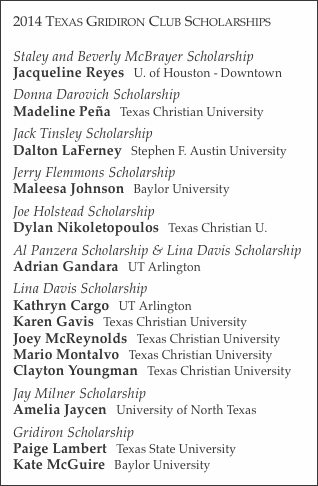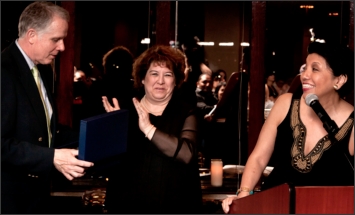
home






Oft-lauded WFAA-TV investigative journalist Brett Shipp added another piece of hardware to the trophy case — Fort Worth SPJ’s Open Doors Award, the organization’s highest honor — at the 11th annual First Amendment Awards and Scholarship Dinner, April 18,
2014,
at Cacharel in Arlington, Texas.
at Cacharel in Arlington, Texas.
The chapter also distributed $22,000 to 14 students who are either from Texas or
attending school in Texas. Providing scholarships dates to the chapter’s early days in the 1940s. Close to half a million dollars has been handed out,
$238,500
of that since 2000.
of that since 2000.




keynote speech video
Shipp has received three duPonts and three Peabodys since 2003 in recognition
for stories such as the alleged inhumane treatment of women and children
immigrants at a federal prison in Texas, the fake drug scandal at the Dallas
Police Department and the mistreatment of injured workers by the Texas Workers
Comp Commission, which was abolished as a result. Shipp was the first local
reporter on the scene in New York City following the
9-11 attacks. In 2003 and 2005 he was named a finalist for Harvard University’s Goldsmith Prize for Investigative Journalism.
9-11 attacks. In 2003 and 2005 he was named a finalist for Harvard University’s Goldsmith Prize for Investigative Journalism.
He joins previous Open Doors recipients Betty Brink, Fort Worth Weekly; the WFAA-TV team of Mark Smith, Byron Harris, Billy Bryant and Shipp; Dan Malone at Tarleton State University; Craig Flournoy, Southern Methodist University; Jennifer Autrey when she was with the Star-Telegram; Hadassah Schloss in the Texas Attorney General’s Office; Ralph Langer with the Freedom of Information Foundation of Texas; Diane Wilson, author of “An Unreasonable Woman: A True Story of Shrimpers, Politicos, Polluters, and the
Fight for Seadrift, Texas”; and Jennifer Peebles when she was with Texas Watchdog.
The Open Doors Award celebrates the record of an individual or organization that
defends the people’s right to open government and open records. It complements the chapter’s larger First Amendment Awards competition, which recognizes work that defends
the freedoms guaranteed by the First Amendment to the Constitution, furthers
the people’s right to know how governments and businesses affect their lives, and champions
the powerless and disadvantaged.
2014 First Amendment Award winners (brown type) and finalists, with comments
(italics) from judges at the SPJ Pittsburgh Pro Chapter:
Defending the Disadvantaged
• circulation over 50,000
Scott Farwell, The Dallas Morning News, “The Girl in the Closet: A Survivor’s Story”
Scott Farwell has an excellent narrative style, and the painstaking research put into this detailed story really shows. The tale of the abused and neglected little girl, her rescue and her survival now, years later, is truly heartbreaking and told effectively.
finalists: Jeff Prince, Fort Worth Weekly; Randy Ellis, The Oklahoman
---
• circulation under 50,000
Mark Collette, Corpus Christi Caller-Times, “Toño’s Walk: A Migrant’s Journey, a Family’s Anguish”
This story lays out the life of a migrant worker while also managing to touch the reader’s heart. Well-written, and the subject deserves a follow-up at some point.
• circulation over 50,000
Scott Farwell, The Dallas Morning News, “The Girl in the Closet: A Survivor’s Story”
Scott Farwell has an excellent narrative style, and the painstaking research put into this detailed story really shows. The tale of the abused and neglected little girl, her rescue and her survival now, years later, is truly heartbreaking and told effectively.
finalists: Jeff Prince, Fort Worth Weekly; Randy Ellis, The Oklahoman
---
• circulation under 50,000
Mark Collette, Corpus Christi Caller-Times, “Toño’s Walk: A Migrant’s Journey, a Family’s Anguish”
This story lays out the life of a migrant worker while also managing to touch the reader’s heart. Well-written, and the subject deserves a follow-up at some point.
General News
• circulation over 50,000
Randy Ellis, The Oklahoman, “Stashes of Cash are Tucked Away in Oklahoma State Agency Accounts”
The Oklahoman's various stories about the Oklahoma state government and taxpayer dollars were fascinating. The well-researched, balanced and far-reaching “Stashes of Cash” wins.
finalists: Craig Malisow, Houston Press; Andrew Knittle, The Oklahoman
---
• circulation under 50,000
Mark Collette, Corpus Christi Caller-Times, “Emails Give Peek into Facility Deal”
---
• Spanish language print/online
Ana E. Azpurua, Al Día, “Expansión Salvadoreña”
---
• Spanish language broadcast
Karen Falla, Marysol Gonzalez, Mario Valadez, Univision Dallas, “Sueños Ilegales”
• circulation over 50,000
Randy Ellis, The Oklahoman, “Stashes of Cash are Tucked Away in Oklahoma State Agency Accounts”
The Oklahoman's various stories about the Oklahoma state government and taxpayer dollars were fascinating. The well-researched, balanced and far-reaching “Stashes of Cash” wins.
finalists: Craig Malisow, Houston Press; Andrew Knittle, The Oklahoman
---
• circulation under 50,000
Mark Collette, Corpus Christi Caller-Times, “Emails Give Peek into Facility Deal”
---
• Spanish language print/online
Ana E. Azpurua, Al Día, “Expansión Salvadoreña”
---
• Spanish language broadcast
Karen Falla, Marysol Gonzalez, Mario Valadez, Univision Dallas, “Sueños Ilegales”
Reporting on Open Government
• circulation over 50,000
Texas Tribune Staff, “Bidness as Usual: Ethics and Transparency in the Texas Legislature”
It is obvious that a lot of time, effort, sweat and research went into this very enlightening series about how the part-time Texas Legislature works, how its members might take advantage of their secondary public service jobs to service their regular full-time positions, and how citizens are unaware of such conflicts of interest.
finalists: Nolan Clay, The Oklahoman; Eric Griffey, Fort Worth Weekly
---
• circulation under 50,000
Mark Collette, Corpus Christi Caller-Times, “City Tax Board Draws Heat for Secrecy; Incentives are Discussed for Project RJ”
Solid reporting uncovers an issue that taxpayers should know about. This reminds us why the media is a vital watchdog.
• circulation over 50,000
Texas Tribune Staff, “Bidness as Usual: Ethics and Transparency in the Texas Legislature”
It is obvious that a lot of time, effort, sweat and research went into this very enlightening series about how the part-time Texas Legislature works, how its members might take advantage of their secondary public service jobs to service their regular full-time positions, and how citizens are unaware of such conflicts of interest.
finalists: Nolan Clay, The Oklahoman; Eric Griffey, Fort Worth Weekly
---
• circulation under 50,000
Mark Collette, Corpus Christi Caller-Times, “City Tax Board Draws Heat for Secrecy; Incentives are Discussed for Project RJ”
Solid reporting uncovers an issue that taxpayers should know about. This reminds us why the media is a vital watchdog.
Investigative
• circulation over 50,000
Nolan Clay, Robby Trammell, The Oklahoman, “Shadid Still Fighting to Keep Past Secret”
The Oklahoman went to the mat to have opened the sealed divorce records of a mayoral candidate who had invoked his Fifth Amendment privilege against self-incrimination. The publication had no choice but to investigate possible criminal wrongdoings of a government official. That’s what good journalism does — it protects the public.
finalists: Nolan Clay, The Oklahoman; Peter Gorman, Fort Worth Weekly
---
• circulation under 50,000
Douglas Kirk, *Morton Falls Publishing Co., “$451 Million Bond Issue”
Good use of public records combine with good writing and reporting to keep the public informed on a very important, and expensive, issue.
---
• Spanish language print/online
Ana E. Azpurua, Al Día, “Laberinto de Barreras”
---
• Spanish language broadcast
Yezmin Thomas, Daniel Manrique, KXTX Telemundo 39, “Adolescentes: la Presa Fácil del Narco”
• circulation over 50,000
Nolan Clay, Robby Trammell, The Oklahoman, “Shadid Still Fighting to Keep Past Secret”
The Oklahoman went to the mat to have opened the sealed divorce records of a mayoral candidate who had invoked his Fifth Amendment privilege against self-incrimination. The publication had no choice but to investigate possible criminal wrongdoings of a government official. That’s what good journalism does — it protects the public.
finalists: Nolan Clay, The Oklahoman; Peter Gorman, Fort Worth Weekly
---
• circulation under 50,000
Douglas Kirk, *Morton Falls Publishing Co., “$451 Million Bond Issue”
Good use of public records combine with good writing and reporting to keep the public informed on a very important, and expensive, issue.
---
• Spanish language print/online
Ana E. Azpurua, Al Día, “Laberinto de Barreras”
---
• Spanish language broadcast
Yezmin Thomas, Daniel Manrique, KXTX Telemundo 39, “Adolescentes: la Presa Fácil del Narco”
Green News
• circulation over 50,000
Dianna Wray, Houston Press, “Chemically Burned”
The story of Brian Jones’ death from an explosion at a Dow Chemical-owned plant is a fine example of substantive journalism. The reporter sheds light on the wider implications of industrial accidents and the lack of regulations that might prevent them while artfully weaving in the horrifying details of a personal tragedy that claimed a life and forever changed a family.
finalist: Peter Gorman, Fort Worth Weekly
---
• circulation under 50,000
John D. Harden, Denton Record-Chronicle, “Drops in the Bucket”
This is an eye-opening story about water loss and what it is costing Denton in terms of both lost water and lost revenue. It is well-sourced and does a good job of comparisons with other cities and areas in Texas, both larger and smaller.
---
• broadcast
Ryan Loyd, Texas Public Radio, “Bats vs. Development”
This is an intriguing story about destroying a bat cave in order to build housing. The reporter produced a balanced, documented report that presented the opinions of both sides. The natural noise of the bats flying and the small bits of information about them were particularly interesting.
• circulation over 50,000
Dianna Wray, Houston Press, “Chemically Burned”
The story of Brian Jones’ death from an explosion at a Dow Chemical-owned plant is a fine example of substantive journalism. The reporter sheds light on the wider implications of industrial accidents and the lack of regulations that might prevent them while artfully weaving in the horrifying details of a personal tragedy that claimed a life and forever changed a family.
finalist: Peter Gorman, Fort Worth Weekly
---
• circulation under 50,000
John D. Harden, Denton Record-Chronicle, “Drops in the Bucket”
This is an eye-opening story about water loss and what it is costing Denton in terms of both lost water and lost revenue. It is well-sourced and does a good job of comparisons with other cities and areas in Texas, both larger and smaller.
---
• broadcast
Ryan Loyd, Texas Public Radio, “Bats vs. Development”
This is an intriguing story about destroying a bat cave in order to build housing. The reporter produced a balanced, documented report that presented the opinions of both sides. The natural noise of the bats flying and the small bits of information about them were particularly interesting.
Opening the Books
• circulation over 50,000
Morgan Smith, The Texas Tribune, “Faking the Grade”
This engrossing series uncovered a lot of evidence of how the No Child Left Behind policy has gone wrong in Texas, with private tutoring companies not coming up with the results they are paid for. This affects not only parents with students in public schools but also all taxpayers — everyone should know how federal dollars are used in educating our future generations.
finalists: Craig Malisow, Houston Press; Eric Griffey, Fort Worth Weekly
---
• broadcast
Ryan Loyd, Texas Public Radio, “Brooks in Business”
This is an interesting and informative story on how a former Air Force base has been developed to become an economic force in its neighborhood and bring much-needed businesses to the area. Interesting sound bites let some of those involved tell the story, and the longer length (over 4 minutes for this story) serves the subject well.
• circulation over 50,000
Morgan Smith, The Texas Tribune, “Faking the Grade”
This engrossing series uncovered a lot of evidence of how the No Child Left Behind policy has gone wrong in Texas, with private tutoring companies not coming up with the results they are paid for. This affects not only parents with students in public schools but also all taxpayers — everyone should know how federal dollars are used in educating our future generations.
finalists: Craig Malisow, Houston Press; Eric Griffey, Fort Worth Weekly
---
• broadcast
Ryan Loyd, Texas Public Radio, “Brooks in Business”
This is an interesting and informative story on how a former Air Force base has been developed to become an economic force in its neighborhood and bring much-needed businesses to the area. Interesting sound bites let some of those involved tell the story, and the longer length (over 4 minutes for this story) serves the subject well.
Student Work
David Trower, Baylor Lariat, “Sex, Violation, Power: Monsters Don’t Always Sleep Under the Bed,
Sometimes They Sleep Down the Hall”
This topic took courage for a college newspaper to tackle. Solid reporting and good writing address a topic that is relevant to all members of a college community.
David Trower, Baylor Lariat, “Sex, Violation, Power: Monsters Don’t Always Sleep Under the Bed,
Sometimes They Sleep Down the Hall”
This topic took courage for a college newspaper to tackle. Solid reporting and good writing address a topic that is relevant to all members of a college community.
*under 10,000 circulation
